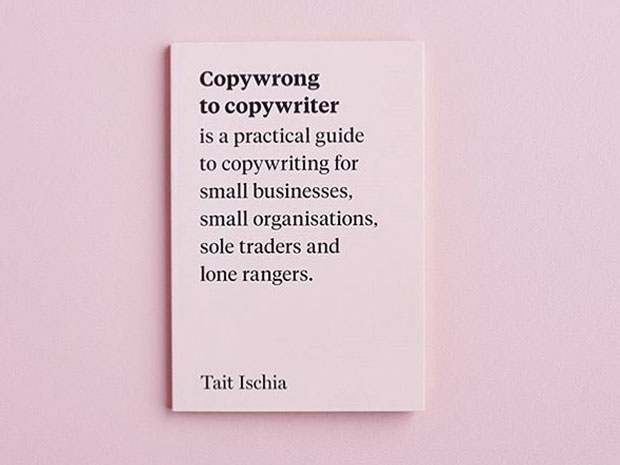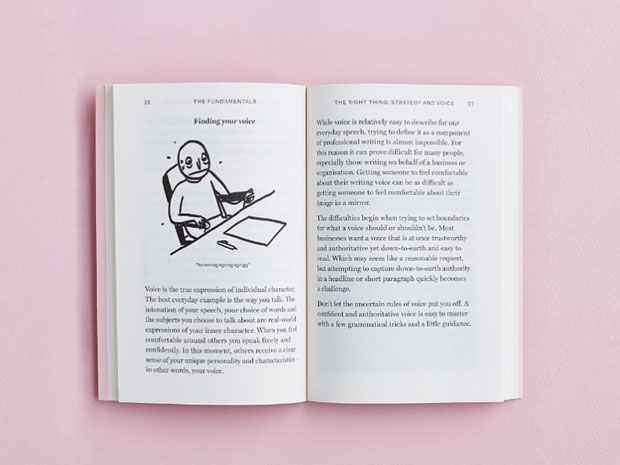the small business guide to copywriting
How do you write a bio? Which words convince people to buy? What makes for good SEO? Tait Ischia, author of Copywrong to Copywriter is here to answer your questions.
You made a thing and now you have to talk about it. More specifically, you have to write a whole bunch of words about yourself, your work and convince people to buy your stuff. Ahh! Deep breaths, everyone. Tait Ischia, word guru and author of Copywrong to Copywriter is here to help.

Illustration by Jacob Zinman-Jeanes
In plain and simple terms, what is copywriting? Copywriting is writing that compels an action. I think it's important that people see copywriting as a strategic pursuit – it's not just about finding fun or interesting words, it's about deciding on a strategy and using words to deliver on that strategy. The more you can approach copywriting as thinking hard about what you want people to do, then writing in a way that convinces people to do it, the more success you will have.
What makes an effective piece of copy? Immediate clarity. As a reader, I shouldn't need to think all that hard. It just hits me – bam! Instant understanding. I know what you're talking about and I know if I'm going to do something about it or not.
What are your tips for writing a great 'About Me' page? Bios are hard for everyone, even me! Writing about yourself is like looking at a bad selfie – the process makes you second-guess yourself and your talents. The key is to get over yourself and write confidently about what you have to offer the world. Don't fluff, don't add too much random stuff about your interests, just be clear, honest and confident.
If you have a personal website (e.g. yourname.com) your bio should probably be in the first person. The reader is assuming a direct one-on-one relationship with you – your writing should reflect that. If you've been asked to provide a bio for a magazine or website, write in the third person. That way it'll sound like the publication is talking about you. Some people try to get around the awkwardness of writing about themselves on their personal website by writing in the third person, when really they should just be more confident.

What’s your advice for writing more salesy copy? There's a saying in the copy world: 'Ask for the sale'. Which basically means, don't be shy, don't beat about the bush, be straight and tell people what you want them to do. "I have a great thing, it's great for these reasons, so buy my thing!" Much like writing your bio, it's all about confidence.
When it comes to calls to action (CTAs) beware of the 'buy now' trap. Much data and testing has shown that toning down your language (eg. 'learn more') can actually encourage more people to click through from your social media posts and eventually buy your product. The 'buy now' action can feel a bit too intense and stop people from poking around and investigating further. Ease them in slowly and you'll have a better chance of getting that sale at the end of the process.
How do you go about finding your business's tone of voice? Tone is a complex subject. What makes a tone? It's a mix of words, pace, images, ideas and strategy, all rolled into one. The best way to explain it is getting a call from a friend. The way they greet you, the sound of their voice, the words they use, their humour – all of these things make up their tone.
In my book, I try and convey the idea that if you're a business owner, you're the best person to write your own copy. You know how you talk already, you've built up a reputation, you've established how serious or fun you are with your customers or clients, you know all these things better than anyone. All you need to do is capture that energy and write it on the page. That's your tone of voice.
The challenge with tone is when you're trying to get your employees to write in a way that's consistent with the way you write. That's when it's important to try and capture what makes your tone unique, what words you would and wouldn't use, when to be serious, when to be playful, when to be thoughtful, when to be witty, and so on, so that others can express your tone when you're not around.
A lot of daily marketing takes place on social media. Any pointers on how to write well on this platform? I am terrible at social media. I agonise over every sentence and never post anything. My wife on the other hand is amazing (she does all my social media). For her, being engaging is about being relevant and posting often. The more you think about it and agonise over it, the less effective you'll be.
With Instagram becoming such a ubiquitous presence in everyone's life, cutting through to people is increasingly about being radically open and honest. I've seen 200 word essays posted on Instagram that get thousands of likes. Short and sharp isn't always the key – sometimes long, open, honest expositions about life and humanity is more effective. I think the point is, it's not the writing that matters, it's what you have to say that people care about most.
What’s the one thing you need to know about SEO when it comes to copywriting? Good writing is good SEO. Google's algorithm has been refined over the years in an attempt to make sure only the most relevant, most useful content appears first in any search. Don't go thinking that good SEO means making a long list of keywords and stacking them in your copy. This is one very marginal tactic in the overall mix of things you need to do to rank well.
Google has a list of over 100 measures it uses to develop a PageRank and one of them is the age of your domain. I worked on a job once where a company spent a lot of money trying to write better SEO copy, but no matter what they did they couldn't outrank their competitor because their domain name hadn't been around for as long.

What would you tell someone who's terrified of writing? I have a few tactics in my book. One of them is to 'write hot, edit cold', which basically means writing as much as possible without editing (the hot part), putting your writing away, then coming back later to edit your work (the cold part). Put your inner editor aside and just write.
The other way is to get clear on what you want to say before you start writing. I think a lot of people start writing without really knowing what their strategy is. What do you want people to do? Who are you talking to? What is their context? What problems are they trying to solve? Why will your thing help them solve a problem in their world? When you have the answers to these questions, the copy will flow with wild abandon.
What should you avoid when it comes to copywriting for your own business? Trying too hard to sound flash and failing to say anything meaningful. The key is to start with having something useful or unique to say, then trying different words and sentences to express that idea.
Any resources that you would recommend? Wiley's Australian Style Manual is a classic. If you've ever wanted to know how to format bullet points correctly (at least in the Australian context) this book is for you. If you want to get better at grammar, I recommend Oxford's Everyday Grammar. It's tough going at times, but once you know the rules of grammar, writing well becomes a lot easier. I also recommend Spunk and Bite by Arthur Plotnik. It's a fun and funny book that encourages you to break all the rules in order to make your writing richer, more meaningful and more unique.
Check out Tait's book Copywrong to Copywriter for more words of encouragement and practical tips on writing for small business. If you're raring to go, you can also print out Tait's downloadable worksheet. (It'll get you thinking about your audience and tone of voice.)

.jpg&q=80&h=682&w=863&c=1&s=1)
.jpg&q=80&h=682&w=863&c=1&s=1)











.jpg&q=80&w=316&c=1&s=1)













.jpg&q=80&w=316&c=1&s=1)










